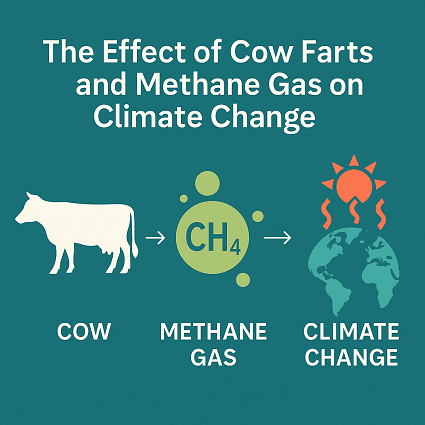The Effect of Cow Farts and Methane Gas on Climate Change
Introduction
When people think about greenhouse gases and climate change, carbon dioxide often gets the most attention. However, methane (CH₄)—a gas that is over 25 times more effective than CO₂ at trapping heat in the atmosphere over a 100-year period—plays a major role in global warming. Surprisingly, one of the largest human-related sources of methane comes from livestock, particularly cows. Their digestive systems naturally produce methane, released primarily through belching and, to a lesser extent, flatulence. This seemingly humorous fact has very serious implications for our climate.
Why Cows Produce Methane
Cows are ruminants, meaning they have a specialized stomach with four compartments that allows them to digest tough plant material like grass. During this process, called enteric fermentation, microbes in the stomach break down food and produce methane as a byproduct. Most of this methane escapes through the cow’s mouth (burps), while some is released through manure and, in smaller amounts, through flatulence.
With billions of cattle raised worldwide for meat and dairy, the cumulative emissions add up to a significant climate concern.
How Big Is the Problem?
- Methane’s potency: Methane traps heat far more efficiently than CO₂, though it remains in the atmosphere for a shorter period (around 12 years compared to centuries for CO₂).
- Livestock emissions: According to the United Nations Food and Agriculture Organization (FAO), livestock contribute roughly 14.5% of all human-induced greenhouse gas emissions, with cattle responsible for about two-thirds of this share.
- Global warming impact: Agriculture-related methane emissions are a major driver of near-term warming, making them a critical target for climate mitigation strategies.
Environmental Consequences
The methane released by cows intensifies the greenhouse effect, leading to:
- Rising global temperatures that drive extreme weather events such as heat waves, droughts, and floods.
- Melting ice caps and rising sea levels, threatening coastal cities and ecosystems.
- Agricultural disruptions, as changing weather patterns make food production less predictable.
This highlights the irony: while cows are a food source, they are also contributing to the very climate shifts that threaten agriculture itself.
Solutions and Innovations
Researchers and farmers are exploring ways to reduce methane emissions from cattle without compromising food production:
1. Dietary Adjustments
Adding seaweed, garlic, or special feed supplements can reduce methane production in cows’ digestive systems.
Improving feed quality can also help cows digest more efficiently, reducing the amount of methane produced.
2. Manure Management
Covering manure lagoons and capturing methane can turn waste into usable biogas for energy production.
3. Breeding and Genetics
Selective breeding for cattle that produce less methane is an emerging field of research.
4. Alternative Proteins
Promoting plant-based diets and meat alternatives can reduce reliance on beef, lowering the demand for cattle production.
The Bigger Picture
While cow methane is just one piece of the climate puzzle, tackling it could yield rapid benefits. Because methane has a shorter lifespan in the atmosphere than carbon dioxide, reducing emissions today can slow warming relatively quickly—buying time for longer-term carbon reduction strategies.
Conclusion
The issue of cow farts and methane may sound amusing, but its role in climate change is anything but a joke. Addressing livestock emissions through innovative farming practices, dietary changes, and consumer choices is an essential step toward a more sustainable future. By cutting methane now, we can make a meaningful difference in slowing the pace of global warming.


